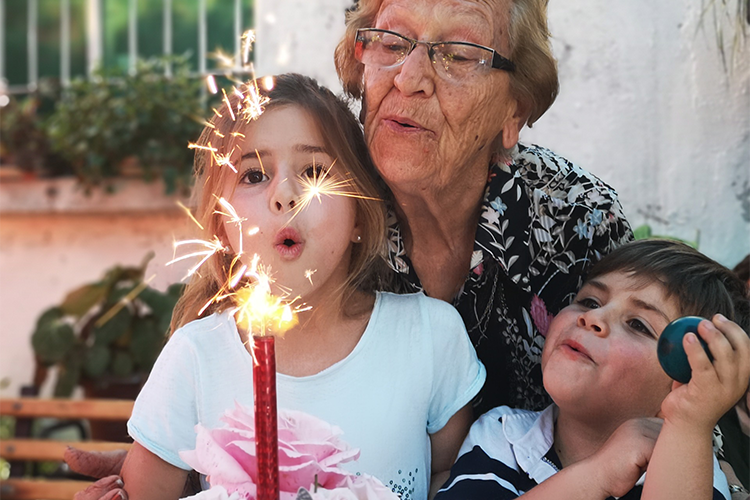A Power of Attorney for Health Care (PAHC) is a legal document that allows you to stay in charge of your care by selecting and naming who will make decisions for you if you become incapacitated. Care decisions include matters like:
- Selecting and removing health care providers and institutions,
- Consenting to or refusing diagnostic tests, medical treatment, services, procedures or medication programs,
- Giving instructions regarding whether to provide, withhold or withdraw all forms of treatment, including artificial nutrition and hydration (for example, tube feeding) and cardiopulmonary resuscitation (CPR), and
- Deciding on other matters affecting your mental or physical condition (for example, decisions concerning dietary selections).
The person who signs the PAHC is called the Principal; a person named to make care decisions on the Principal’s behalf is called an Agent.
In addition to naming an Agent to make care decisions, the Principal may also include individual health care instructions in the PAHC. Individual health care instructions are the Principal’s specific instructions regarding future care decisions. The Principal may limit the instructions so that they apply only if a particular condition occurs. California law also allows the Principal to communicate individual health care instructions to the Agent orally or in a document separate from the PAHC.
When Does a PAHC Begin?
A PAHC may be either “immediate” or “springing.” An Agent’s authority under an immediate PAHC begins at the time the document is signed. An Agent’s authority under a springing PAHC begins only on the occurrence of a later event. Frequently, that event is a determination that the Principal lacks capacity.
About Capacity
In the PAHC context, “capacity” means that the Principal is able to understand a decision’s nature and consequences, is able to make a decision and communicate a decision and, when considering proposed health care, is able to understand the significant risks, benefits and alternatives.
Unless the PAHC provides otherwise, the Principal’s primary physician is the one who determines the Principal’s capacity. If the Principal has not selected a primary physician, or the selected physician is unavailable or unwilling to act, the physician who has taken on primary responsibility makes the determination.
When Does a PAHC End?
Unless the PAHC states a specific termination time, it remains in effect until the Principal’s death. However, the Agent’s authority with respect to decisions regarding organ donation, authorizing an autopsy and disposing of the Principal’s remains continues beyond the Principal’s death.
Revoking a PAHC
The Principal must have capacity in order to revoke all or any part of a PAHC. To revoke the naming of an Agent, the Principal must either sign a written revocation or inform the supervising health care provider personally. To revoke an entire PAHC or any part (except for the naming of an Agent), the Principal may communicate the intent to revoke by any means and at any time. Although California law allows the Principal to revoke a PAHC orally, we recommend signing a written revocation (which can be included in a new PAHC).
If the Principal names his or her spouse as an Agent, and the marriage is later dissolved or annulled, the naming of the former spouse is automatically revoked.
Is a PAHC Required?
No health care provider, institution or insurance company can require you to sign or revoke a PAHC before providing you with care, admitting you to a facility, or providing you with health insurance. Neither can you be prohibited from signing or revoking a PAHC.
Preparing a PAHC
There are three principal types of PAHC documents:
- Pre-printed forms. H.E.L.P. offers a simplified pre-printed form.
- Attorney-drafted PAHCs.
- A statutory form. Section 4701 of the California Probate Code includes language that should be included in preparing your own PAHC.
You can obtain H.E.L.P.’s pre-printed PAHC form and the related wallet card, for free, in the search box above.
Remember: Pre-printed and statutory forms are not suitable for every person or in every situation.
What Happens Without a PAHC or Surrogate?
If you are unable to make care decisions and have not signed a PAHC or individual health care instructions or named a surrogate (see Naming a Temporary Surrogate), the medical system will typically pay attention to the decisions of your closest family members. But what happens if there is disagreement among family members or between family members and medical providers? In that situation the courts may have to step in. California law does not include a statute that sets forth who has priority in making decisions for a person who has not named a decision-maker.
Legal Requirements
California PAHCs must meet each of the following requirements:
- The Principal must sign the document. Alternatively, another adult may sign the document in the Principal’s name, at the Principal’s direction, and in the Principal’s presence.
- The Principal must have capacity at the time the document is signed.
- The document must include the date of signing.
- The document must be acknowledged before a notary public or signed by at least two adult witnesses. The witnesses must either (1) witness the Principal’s signing of the document or (2) witness the Principal’s signing of an acknowledgement of the Principal’s signature or of the PAHC. Each witness must sign a declaration that includes language required by California law. Further, a witness should not be related to the Principal by blood, marriage, or adoption or entitled to inherit from the Principal by operation of law or under any will existing at the time the PAHC is signed.
- The following individuals may not witness a PAHC:
- The Principal’s health care provider or an employee of the provider,
- A community care facility operator or employee,
- The operator or employee of a residential care facility for the elderly or
- An Agent named in the PAHC.
Special Witness Requirements for Nursing Home Residents
If the Principal is a resident in a skilled nursing facility, a patient advocate or ombudsman must witness the document being signed or, if the document is notarized, as a separate witness. The patient advocate or ombudsman must also sign a special declaration that he or she is serving as a witness as required by Section 4675 of the Probate Code.
Coordination With Other Powers of Attorney
Matters dealt with under the PAHC should be coordinated with provisions in any other power of attorney that relates to the same or similar matters, such as a durable power of attorney for financial matters (DPAFM). We recommend that the documents state who has final authority in the case of disagreement. In addition, the Principal should consider including a provision in the Principal’s DPAFM directing the agent under the DPAFM to pay for any costs incurred by the Agent under the PAHC.
Selecting Agents
The PAHC gives the Agent the power to make care decisions for the Principal, including the power to authorize, withhold or terminate life-sustaining treatment. The Principal should carefully select the Agent. The following are important factors to consider:
- Most important, the Agent should be someone with whom the Principal communicates well.
- The Agent should be available when needed.
- The Agent should be someone who will make decisions in accordance with the Principal’s wishes, even if the Agent disagrees with those wishes.
- The Agent should be someone who will stand up for the Principal and be able to deal with others (medical personnel, family members or friends) who disagree with the Principal’s wishes.
At a minimum, the Agent should be an adult 18 years of age or older, clearheaded, and have the capacity to make decisions (see About Capacity).
We recommend that the Principal name a second and a third individual to serve as successor Agents in the event that the prior Agents are unavailable. We also recommend that the Principal give a copy of the completed and signed PAHC to the Agent and each successor Agent as well as to the Principal’s physicians and close family members.
Naming Co-Agents
Generally, we recommend against naming Co-Agents (Agents who must act together). Naming Co-Agents can cause problems if the Co-Agents are unable to agree on decisions or if one of the Agents is not readily available. In this situation, the medical system could well operate as if the Principal had never named anyone to speak for him or her.
Ineligible Persons
Some individuals may not serve as an Agent:
- The Principal’s supervising health care provider,
- The operator of a community care facility or residential care facility at which the Principal is a patient,
- An employee of a health care institution, community care facility or residential care facility at which the Principal is a patient, unless the employee is related to the Principal, is the Principal’s registered domestic partner, or is employed by the same institution or facility as the Principal.
Agent-Selection Alternatives
If you do not know someone to name as an Agent:
- Consider banding together with a group of people who agree to serve as Agents for one another. You can name one group member as your initial Agent and two others as successor Agents. The group can replace members if they become unavailable.
- You can hire a professional care manager or professional fiduciary to act as your Agent. The Aging Life Care Association, a non-profit organization, lists names of professional care managers at www.aginglifecare.org.
- Names of professional fiduciaries who serve as Agents are listed by the Professional Fiduciary Association of California at pfac-pro.org. Click on “Referrals” on the left side of the web page. Of course, you’ll want to check the references of any professional you are considering to retain.
Alternatively, individuals with no one to name as an Agent may sign a document containing individual health care instructions. We recommend signing a PAHC, rather than only individual health care instructions, since an Agent has flexibility to deal with situations that may not have been anticipated.
Agent Duties and Authority
- The named Agent is not required to act under the PAHC, unless the named Agent has agreed in writing to act as Agent or has taken other action that indicates agreement.
- When acting, the Agent must act consistently with any written or oral instructions of the Principal and with any other known wishes of the Principal. If the Agent does not know the Principal’s wishes, the Agent is required to act in the Principal’s best interest, taking into account the Principal’s personal values known to the Agent.
- If an Agent learns that the PAHC has been revoked, the Agent must promptly notify the supervising health care provider and any institution that is caring for the Principal.
Authority in General
An Agent has priority in making decisions for the Principal over any other person, unless the PAHC states otherwise or the Principal has named a temporary surrogate. It is important that everyone involved knows that the Agent is available.
The Agent has authority to choose the care that the Principal will or will not receive, including the authority to decide whether life-sustaining treatment will be provided. The Agent may not, however, consent to abortion, sterilization, mental health treatment facility commitment or placement, convulsive treatment or psychosurgery. In addition, the Agent is not authorized to make a decision to which the Principal objects, assuming that the Principal has capacity.
The Agent also has authority to make the following decisions that extend beyond the Principal’s lifetime:
- Whether to make an anatomical gift under the Uniform Anatomical Gift Act,
- Whether to authorize an autopsy and
- How to dispose of the Principal’s remains.
If the Principal does not want the Agent to have all of the above powers, the Principal may limit the Agent’s powers in the PAHC.
Authority to Make Personal Care Decisions
In addition to the above powers, the Principal may give the Agent authority to make personal care decisions on the Principal’s behalf. Personal care decisions may include decisions regarding:
- Living arrangements,
- Hiring household employees,
- Providing transportation and meals,
- Handling mail and
- Arranging recreation and entertainment.
The authority to make personal care decisions may be included in the PAHC, in a DPAFM or in a separate power of attorney.
Access to Health Information
Generally, under Federal law the Agent has the right to inspect and obtain a copy of the Principal’s health information. The Agent also has the right to authorize disclosure of the Principal’s health information to others. California law also gives the Agent the right to access the Principal’s health information and to authorize disclosure.
Warning: A careful reading of California and Federal law suggests that, if the Principal has signed a “springing” PAHC, the Agent may not have the right to access the Principal’s health information or to authorize disclosure until the PAHC has become effective.
Paying the Agent
Since Agents are often close family members or friends, Agents are frequently not compensated.
If the Principal wants the Agent to be paid for performing his or her duties and/or reimbursed for reasonable expenses, include this expressly in the PAHC. A provision authorizing payment and/or reimbursement of the Agent should also be included in the Principal’s DPAFM.
Communicating
If the Principal wants to ensure that his or her wishes are followed, it is imperative that the Principal and Agents discuss the Principal’s desires, values and views about what makes life worth living for the Principal. Otherwise, the Agents may not have the information necessary to be able to make the decisions the Principal wants.
H.E.L.P. has created a free guide called Your Way: A Guide to Help You Stay in Charge. Using this guide will:
- Help you think about what is important to you,
- Help you stay in charge of your care, even if you are unable to speak for yourself and
- Help you communicate your wishes to your Agents.
- You can obtain one free copy through this site.
In addition to the Agents, we recommend that the Principal communicate this information to physicians and close family members and friends so that these individuals will be aware that the Agent is following the Principal’s instructions.
Summing Up
The legal and communication tools that allow you to control decisions about your care are readily available. You need to take two steps:
- Sign a PAHC naming one or more carefully-selected Agents.
- Sort out and communicate to your Agents and others your feelings on medical treatment, how you want to live and what makes life worth living for you.
Once you’ve done the paperwork:
- Give copies of the PAHC to your Agent, successor Agents, close family members and friends and medical providers. A copy has the same effect as the original.
- Complete a wallet card that notifies emergency medical personnel that you have signed a PAHC and includes the names and telephone numbers of your Agents. Keep it with your driver’s license or other I.D.
- Remember that things change. Periodically review your PAHC and communication documents to ensure that your designation of Agents is up-to-date and that your wishes are still accurately expressed.



